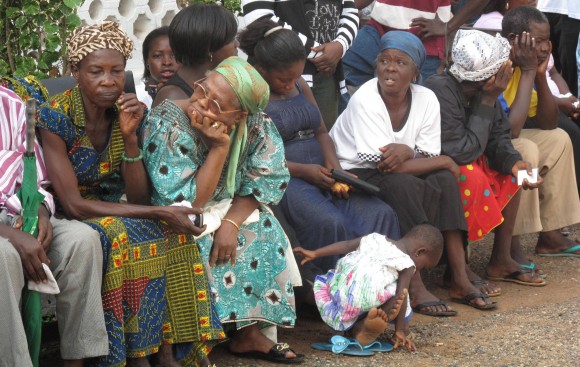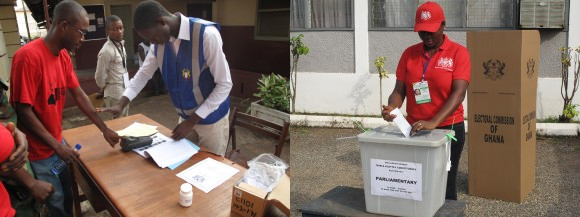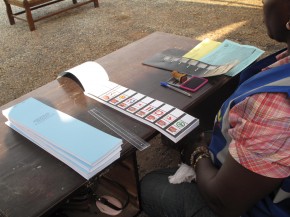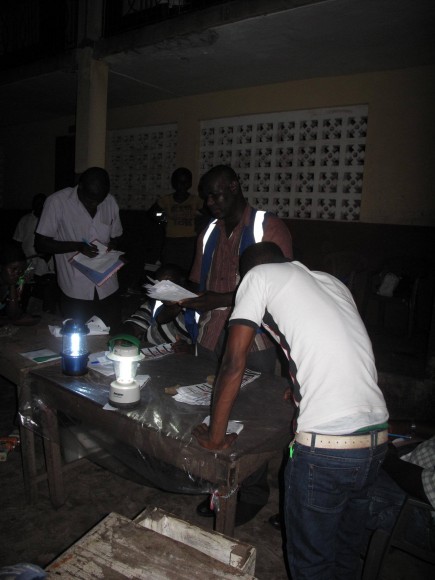For once the streets of Accra were deserted when I drove through them early on Friday morning, the rush hour traffic – blaring horns, crowded tro-tros and overloaded lorries - had dissipated; everybody was voting. A long queue snaked round the back of the school and all the way around the playground at the first polling station I visited as voting started at 7am. I went to talk to the man at the very front of the queue to find out what time he had arrived. He must have been around 70 years old. “One o’clock in the morning” he replied – I asked him why he had come to vote, “because I think it’s important”.

Throughout the day, it was the same type of humbling experiences – at the next polling station, the middle age woman at the front of the queue had been sitting there since 8pm the previous evening. The sun was now getting hotter, and the ballot boxes still hadn’t arrived, but the queue waited patiently. Eventually when the ballot materials did arrive the presiding office took control of the situation – he waved the empty ballot box vigorously above his head to show there was nothing inside it. Warming to his routine he carried on, announcing “I now declare this polling station officially…open!” rousing a huge cheer from the queue.

The voting materials were just arriving at the next polling station I visited. The police swept into the courtyard in their pick-up truck, depositing three boxes of materials and speeding on to the next station. The presiding officer of the polling station carefully checked the serial numbers of the booklets of ballot papers against his list, then meticulously fastened 9 security seals on each of the empty ballot boxes. The party agents present checked for any irregularities, carefully noted all the serial numbers and scrutinised the biometric verification machine. UK aid helped train 276,000 party polling agents for election day duties. When the agents were satisfied, it was time to start voting. First – name on the voter registration card checked against the list by one Electoral Commission official, next step scanning the barcode on the card and checking the photo matched the holder, then verifying fingerprints on the biometric machine. The next Electoral Commission official then stamps the back of the presidential ballot paper – voter dips their left little finger in indelible ink to show they’ve voted. Behind a cardboard voting booth the voter places a thumb print next to their chosen candidate – ballot paper put in the box, then the same again for the Parliamentary election.

Everywhere I went throughout the day, there was a profound sense of value and importance imbued in the process. The sun got hotter and the queues got longer. Some of the biometric machines broke down, and replacements had to be brought in. Anyone could have been forgiven for losing their patience, but everywhere I went, people remained calm and patient, but determined to have their say. Ghanaians, not normally renowned for queuing, developed a very stoic orderliness for one day only. The whole process felt communal – it felt like everyone was a part of it (as turnout figures of more than 80% seemed later to evidence) regardless of political orientation, everyone felt it was their duty to have their say. I bumped into friends, colleagues, my boxing coach, my local barman – everyone had come out, and was patiently waiting in the queue for their chance to be heard.

The voting, and the queues, carried on late into the afternoon and on into the evening. Technical problems meant that some polling stations had to resume on Saturday morning, but the majority finished on Friday evening. For those stations which did finish the same day, having begun in the early hours of the morning, many voters were back at 7pm or 8pm in the evening for the count. The Security Services set a perimeter a few metres around the polling table, and everyone eagerly pressed against the tape, joining in with the returning officer as they counted the ballot papers for each candidate: “one, two, three”. The minor parties got an ironic cheer as they clocked up only single figure totals, the two major parties elicited a sigh of relief when it got to the end of counting them out - “four hundred and seventy six, four hundred and seventy seven...phew”. The idea of democracy – having a vote, having a voice, never felt quite so palpable.
The results were close. The current President John Dramani Mahama was narrowly re-elected. The Foreign Office Minister for Africa, Mark Simmonds, congratulated Ghana on the elections that were "widely recognised to be free, fair and transparent."
Look out for another post very shortly on some of the work UK aid was supporting for fair elections (and you can find out more in my past blog posts about Ghana Decides).

Recent Comments